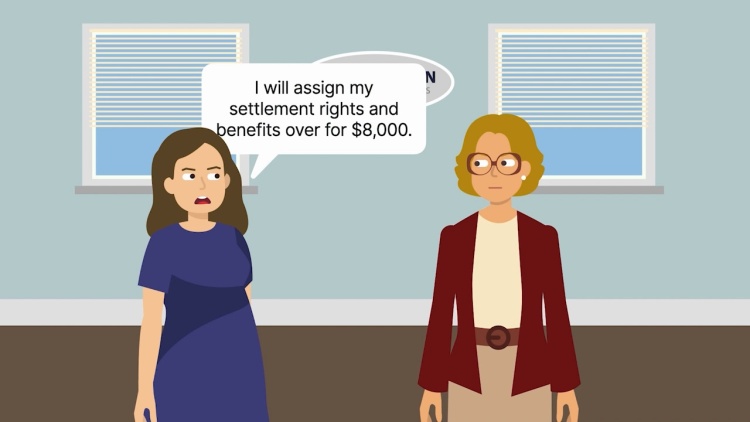Owen v. CNA Insurance/Continental Casualty Company
New Jersey Supreme Court
771 A.2d 1208, 167 N.J. 450 (2001)
- Written by Megan Petersen, JD
Facts
Owen (plaintiff) was a tort victim. Owen received a structured settlement from the tortfeasor’s liability insurance company, CNA Insurance/Continental Casualty Company (Continental) (defendant). Under the terms of the settlement agreement, Owen was entitled to receive an initial lump sum payment of $10,000, attorney’s fees of $15,000, and five deferred periodic payments totaling $81,067.24. The payments were to be paid in 1986, 1991, 1996, 2001, and 2006. The settlement agreement also contained a non-assignment provision stating that the lump sum payments “shall not be subject to assignment, transfer, commutation, or encumbrance,” except as provided in the agreement. In 1997, to cover unrelated medical bills, Owen assigned her 2001 and 2006 deferred lump sum payments to Metropolitan Mortgage and Securities Company (Metropolitan). In January 1998, Owen sent Continental directions to send all future lump sum payments to a new address. Continental requested confirmation that Owen actually lived at this new address. Owen refused to provide confirmation, stating that her place of residence was “irrelevant.” Continental refused to send the remaining lump sum payments to the new address. Owen filed a complaint with the Department of Insurance, but the Department took no action. Owen brought suit in New Jersey state court against Continental seeking a declaratory judgment that the non-assignment clause in the structured settlement agreement was unenforceable. The trial court granted a declaratory judgment for Owen, and Continental appealed. The appellate court reversed, holding that the non-assignment clause was enforceable. Owen appealed.
Rule of Law
Issue
Holding and Reasoning (Stein, J.)
What to do next…
Here's why 907,000 law students have relied on our case briefs:
- Written by law professors and practitioners, not other law students. 47,100 briefs, keyed to 996 casebooks. Top-notch customer support.
- The right amount of information, includes the facts, issues, rule of law, holding and reasoning, and any concurrences and dissents.
- Access in your classes, works on your mobile and tablet. Massive library of related video lessons and high quality multiple-choice questions.
- Easy to use, uniform format for every case brief. Written in plain English, not in legalese. Our briefs summarize and simplify; they don’t just repeat the court’s language.





